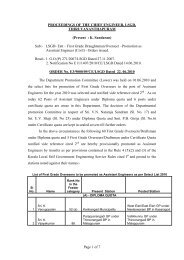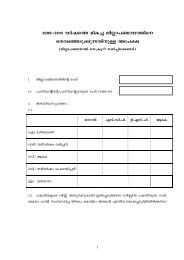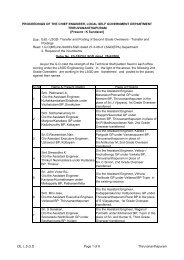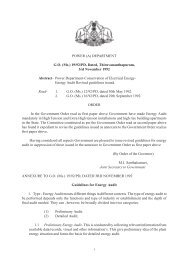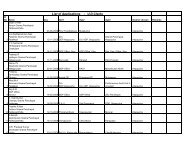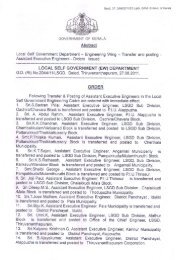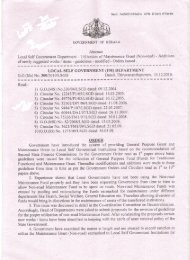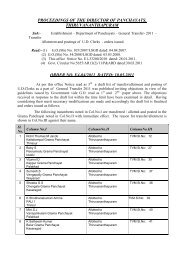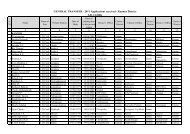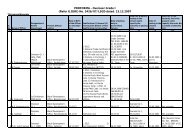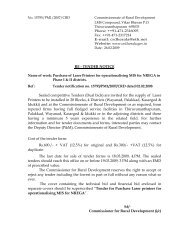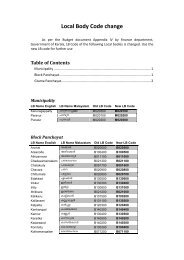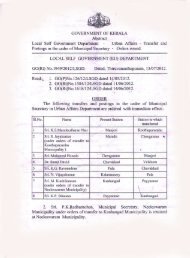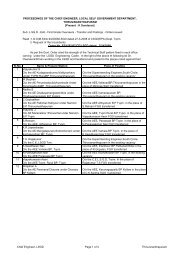Chapter 2 - Kerala Govt Logo
Chapter 2 - Kerala Govt Logo
Chapter 2 - Kerala Govt Logo
- No tags were found...
Create successful ePaper yourself
Turn your PDF publications into a flip-book with our unique Google optimized e-Paper software.
Environmental Assessment Report<strong>Kerala</strong> Local Government Strengthening ProjectThe incentive scheme, Nirmal Gram Puraskar (NGP) was launched by <strong>Govt</strong> of India in 2003 togive a fillip to the TSC by recognizing the efforts of PRIs and institutions who have contributedsignificantly towards ensuring full sanitation coverage in the areas of operation. The mainobjectives of NGP are to:a. bring the topic of sanitation to the forefront of social and political developmentdiscourse in rural Indiab. develop open defecation free and clean villages which will act as models for others toemulatec. give incentives to PRIs to sustain the initiatives taken by them to eliminate the practiceof open defecation from their respective geographic area by way of full sanitationcoveraged. increase social mobilization in TSC implementation , by recognizing the catalytic roleplayed by organizations in attaining universal sanitation coverage.Incentive amounts to PRIs are decided based on population criterion and it is to be used forimproving and managing the sanitation facilities in their respective areas.In <strong>Kerala</strong>, almost 97% of the Grama Panchayats , 83% of Block Panchayats and 57% of theDistrict Panchayats are declared open defecation free and awarded Nirmal Puraskar.Altogether, the incentive amount is around Rs.77 crore. The State Government and the LSGsalso set apart adequate fund for improving the sanitation through establishing systems for solidand liquid waste management, water quality surveillance, hygiene education, environmentalupgradation in addition to human excreta management.2.2.3.3. Watershed Development ProgrammeThe Department of Land Resources in the Ministry of Rural Development is administering thearea-based watershed programmes for development of wastelands/degraded lands namelyDrought Prone Areas Programmes (DPAP), Desert Development Programme (DDP) andIntegrated Wastelands Development Programme (IWDP) and currently the Hariyali scheme tocheck the diminishing productivity of wasteland and loss of natural resources. The state wasearlier covered under the IWDP and currently under Hariyali programme.Under the Hariyali initiative, Gram Panchayats shallimplement projects under overall supervision andguidance of Project Implementation Agencies (PIAs).An intermediate panchayat may be the PIA for all theprojects sanctioned to a particular Block/Taluka. Incase, these Panchayats are not adequatelyempowered, then the Zilla Panchayat can either act asPIA itself or may appoint a suitable Line Departmentlike Agriculture, Forestry /Social Forestry, SoilConservation, etc., or an Agency of the StateGovernment/ University/Institute as PIA. Failing theseoptions, the ZP/DRDA may consider appointing areputed Non-Government Organization (NGO) in theThe process have not yet trickleddown fully and hence theimplementation of watershedprogramme is not very effective.Moreover, the guidelines areinadequate to address therequirements of different ecoregions.The issues with respect towater logged areas are leftunaddressed. Also, the modality forconvergence of ongoing schemes hasnot been highlighted in theguidelines. The proposed ESMF mayfacilitate the integration.50



